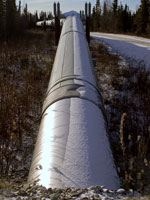
| Pipelines New Review Principles Still Not Enough | 30 January 16 |

Canada's environmental assessment processes are badly broken. By setting out broad expectations that resource projects will have to meet, the government has begun the process of earning public and stakeholder confidence in the process. It is vital that the Canadian government include all greenhouse gas emissions (upstream and downstream) in its assessment of major energy proposals like the Energy East pipeline and the Trans Mountain expansion. It is not yet clear what criteria Cabinet will use to determine the acceptable level of emissions from each project. Clarity on what is and is not acceptable in energy development in Canada is the first step in diversifying the country's resource economy and ensuring a fair, smooth transition for people who work in the fossil fuel industries. Clean energy already produces more direct employment in Canada than the tar sands, even before falling oil prices set off layoffs in the Alberta oil patch. Canada committed to efforts to limit global warming at last month's Paris climate conference, noted John Bennett, with Friends of the Earth in Ottawa. "You can't say you're committed to keeping emissions below 1.5 degrees, and then not count downstream emissions when you're assessing the project," Bennett said. "They're trying to fool themselves or Canadians that we can deal with climate change, and not deal with the fact that we're pumping fossil fuels out of the ground." Bennett said if the Liberals hoped this announcement would achieve "pipeline peace," they're wrong.
View January 29, 2016 National Observer article |
|
 Print version Print version |
Top |
